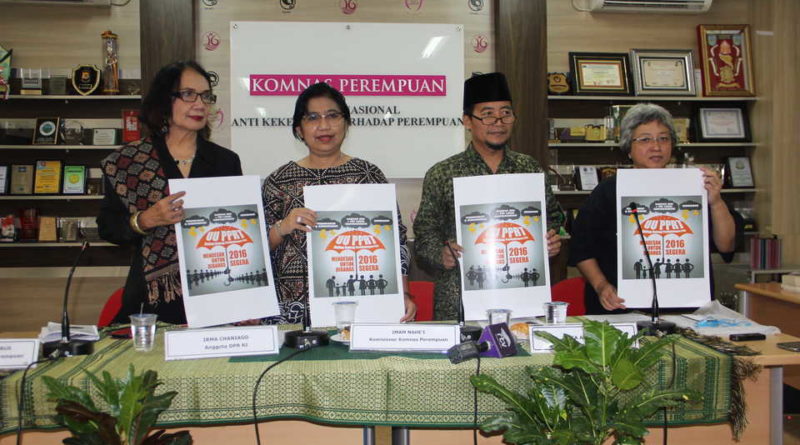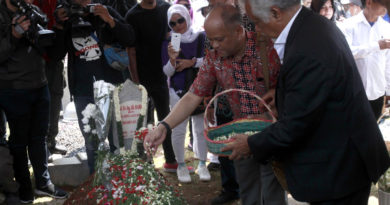COLUMN-OPINION: JOBS- Indonesia’s Domestic Workers Need Urgent Protection by Jack Britton
.
Reports of the mistreatment, exploitation and even execution of Indonesian domestic workers at home and abroad have regularly made media headlines in recent years.
Familiar horror stories of domestic workers’ experiences include starvation in Malaysia, beatings at the hands of abusive employers in Indonesia and beheadings in Saudi Arabia. The latest of these barbaric executions occurred on Oct. 29, when Tuti Tursilawati, a domestic worker and victim of gender-based violence, was beheaded after being found guilty of killing her employer.
Domestic workers are exposed to multiple vulnerabilities which, when combined with the current lack of state acknowledgement and protection, positions them as not only one of the largest segments of the national workforce, but also one of the most at risk.
.
.
ADS by Cloud 9:
.
– SPACE RESERVE FOR YOUR ADVERTISEMENT –
.
.
While accurate statistics regarding the number of domestic workers currently employed in Indonesia are hard to come by, the National Network for Domestic Workers Advocacy (Jala PRT) puts the figure at 4.2 million. In addition to this huge number, migrant domestic workers make up the majority of the 4.5 million Indonesian migrant workers that rights group Migrant Care estimates are currently abroad.
The vast numbers of Indonesian domestic workers can be in part linked to the widespread poverty and limited employment opportunities across the archipelago; but also a historically dominant Javanese culture in which the concepts of feudalism and servitude are entrenched. In the Javanese tradition of “ngenger,” poorer people will join and serve wealthier households; carrying out domestic tasks and helping with the running of the house in return for food, board and possibly schooling.
The domestic work industry, as noted by the International Labor Organization (ILO), remains a heavily feminized sector and 80 percent of all domestic workers are women and girls. The work is demanding and yet undervalued, considered by many in society to be unskilled and without economic value.
.
.
ADS by Cloud 9:
.
– SPACE RESERVE FOR YOUR ADVERTISEMENT –
.
.
Domestic workers make a huge contribution to the national economy, both directly, through the billions of dollars in remittances and wages that enter the Indonesian market each year, and indirectly, by the services they provide freeing up the time of millions of employers which is then spent engaging in economically productive activities.
Jala PRT coordinator Lita Anggraini has been active leading the organization’s advocacy of domestic workers’ rights since its inception 15 years ago. She explained that despite making huge contributions to the economy, the welfare of domestic workers is ignored and their work undervalued. “In Jakarta on average, the salary paid to a domestic worker is only between Rp 1 million and Rp 1.2 million ($66 and $79) per month – only 30 percent of the provincial minimum wage.”
.
.
ADS by Cloud 9:
.
– SPACE RESERVE FOR YOUR ADVERTISEMENT –
.
.
Since world leaders adopted the Sustainable Development Goals during the United Nations summit in 2015, Indonesia has showed its commitment to the global development priorities, but it is lagging in its protection of domestic workers. “Indonesia claims that it embraces the SDGs, but it’s as if these goals do not apply to domestic workers; the SDGs have the motto of ‘no one is left behind,’ but the reality is that domestic workers are being left behind. One of the SDGs is decent work, but it’s as if this means decent work for everyone besides domestic workers,” Lita said.
Legal protections for domestic workers remain extremely limited, while their fundamental labor rights are not adequately protected by any legislation. The lack of legal protections for domestic workers is not due to the absence of a suitable potential legal framework; rather to a resistant national legislature.
The protection of domestic workers’ bill, known as RUU PRT, was drafted in 2004 and it quickly entered the National Legislation Program in the House of Representatives. The creation of the bill was enthusiastically welcomed and championed by civil society organizations and human rights activists, but 14 years later the draft has yet to be enacted. The bill has seen the makeup of the legislature change through two general elections, with a third scheduled for next year.
.
.
ADS by Cloud 9:
.
– SPACE RESERVE FOR YOUR ADVERTISEMENT –
.
.
The bill contains protections for domestic workers’ rights, including the introduction of a standardized minimum wage, regulated working hours, regular days off and protection from mistreatment and violence.
The National Commission on Violence Against Women (Komnas Perempuan) is dedicated to seeing the bill become law. Komnas Perempuan commissioner Thaufiek Zulbahary explained that passing the bill was important to combat the many forms of violence domestic workers face.
“The bill works to build a more positive working environment that will advantage both domestic workers and their employers,” Thaufiek said.
“Achieving decent working conditions for domestic workers is an important part of eliminating violence against women, because most domestic workers are women.
“It is also in line with eliminating poverty, through the provision of a standardized wage.”
.
.
ADS by Cloud 9:
.
– SPACE RESERVE FOR YOUR ADVERTISEMENT –
.
.
There is also a transnational solution to providing legal protections for domestic workers. Members of the International Labor Organization adopted the Domestic Workers Convention in 2011 as an international instrument for the protection of people engaged in domestic work around the globe. The provisions in the convention, known as ILO 189, are in many ways similar to the domestic workers’ bill: regulating working hours, work contracts, minimum wages, workplace health and safety, the right to days off, safeguards for children of domestic workers and protection from violence and mistreatment.
The convention is revolutionary in its protection of domestic workers’ basic rights, but Indonesia has yet to ratified it. As a country with one of the highest numbers of domestic workers in the world, ratification of the convention makes sense to ensure the protection of one of the largest and most vulnerable groups in society.
.
.
ADS by Cloud 9:
.
– SPACE RESERVE FOR YOUR ADVERTISEMENT –
.
.
As next year’s legislative and presidential elections approach and the campaign trail heats up, with candidates vying for prospective votes, the issue of the protection of domestic workers has been noticeably absent from the public discourse. The legislative candidates should make championing the bill and the ratification of ILO 189 a central part of their election platforms. For candidates wanting to show their commitment to protecting millions of Indonesia’s most vulnerable workers, pledging to fight for the smooth passage of the bill and the ratification of Domestic Workers Convention are concrete and simple steps.
As 2019 approaches and the protection of domestic workers bill turns 15 years old, the question begs: How long will Indonesia’s domestic workers remain without the much-needed legal protections?
BY : JACK BRITTON
Jack Britton is a writer currently embedded with Komnas Perempuan in Jakarta. The views expressed in this article are those of the author and do not necessarily reflect the official position of Komnas Perempuan. The author can be reached via email at: [email protected]
.
.
ADS by Cloud 9:
.
– SPACE RESERVE FOR YOUR ADVERTISEMENT –
.
.
 All photographs, news, editorials, opinions, information, data, others have been taken from the Internet ..aseanews.net | [email protected] |.For comments, Email to :D’Equalizer | [email protected] | Contributor
All photographs, news, editorials, opinions, information, data, others have been taken from the Internet ..aseanews.net | [email protected] |.For comments, Email to :D’Equalizer | [email protected] | Contributor









